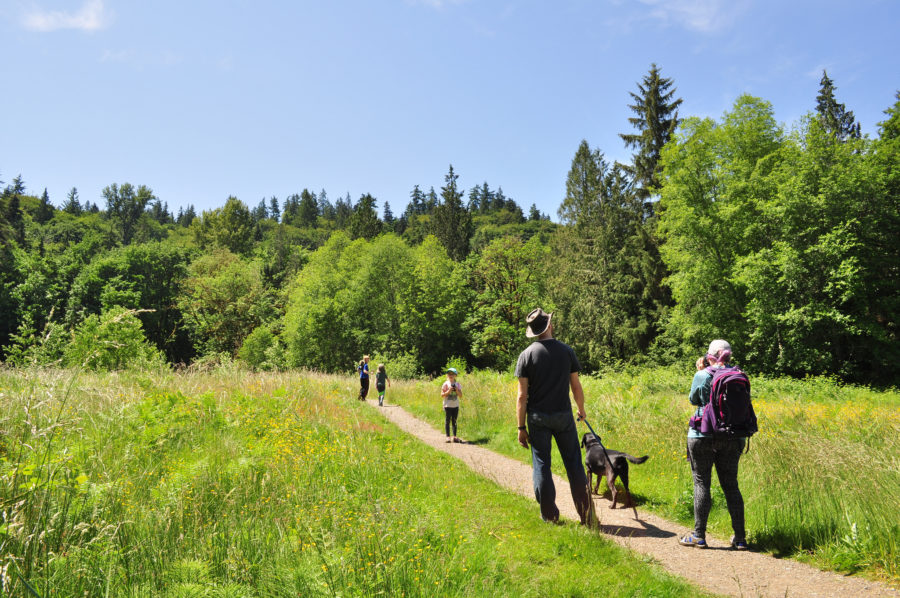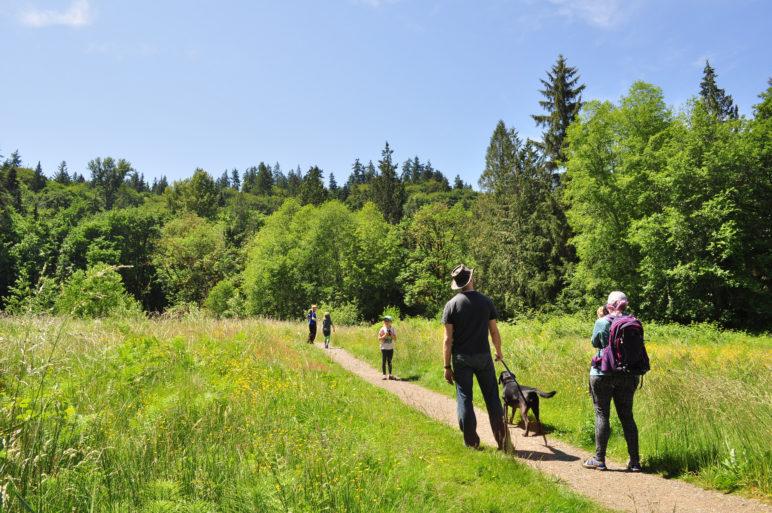Update: The King County Council voted 6-2 to support the moratorium.
King County is poised to join the ranks of Northwest communities that are locking out coal, oil, and gas developments. Later this month, County Councilmember Dave Upthegrove will introduce legislation to prohibit major new fossil fuel infrastructure, including gas pipeline expansions.
It’s the right time for King County to act. Over the last decade, Northwest communities have faced down an onslaught of proposals to build coal export terminals, oil-by-rail transfer depots, petrochemical refineries, gas export sites, and more. The combined carbon throughput of these projects would have outstripped the Keystone XL Pipeline by a factor of five. Most of these schemes wilted away in the face of sustained opposition, but a few goliaths still occupy the field: big proposals on the Columbia River, for example, would require new pipeline capacity in King County to deliver gas from the fracking fields of northern British Columbia.
Energy developments like these are hardly benign for the communities they affect. In fact, a review of recent Northwest history makes clear what’s at stake for King County: pipelines leak and explode; oil trains derail and ignite deadly infernos; coal trains and coal terminals spread harmful dust; tankers spill into rivers and Puget Sound, and liquefied natural gas facilities explode. Allowing the fossil fuel industry to build more fuel-delivery infrastructure puts people’s health and safety at risk.
Read More: The Dangers of Fossil Fuel Expansion
Olympic Pipeline explosion in Bellingham kills three
Loaded Oil Train Derails Under Magnolia Bridge in Seattle
10 Oil Train Explosions in Two Years: A Timeline in Pictures
What Caused the Lac-Mégantic Oil Train To Explode?
From Montana to the Coast, Coal Dust Threatens Human Health
Why Trackside Towns Should Worry About Coal Dust
Proposed Coal Terminal on Columbia River Would Release Far More Coal Dust Than Estimates Indicate
Fifty Years of Oil Spills in Washington’s Waters
Williams Companies Failed To Protect Employees in Plymouth LNG Explosion
The King County ordinance would protect the region’s residents in two ways. First, it would enact a moratorium to temporarily freeze any new fossil fuel infrastructure development proposals and, second, kick off a longer-term regulatory rewrite to prohibit new dirty energy buildout. It’s much the same strategy already deployed by the City of Tacoma and Whatcom County, places that have been repeatedly targeted by the fossil fuel industry.
To understand what’s happening in King County, it’s useful to also understand what has already happened in other Northwest communities.
Portland
Portland boasts the most assertive anti-fossil fuel land-use regime in North America, thanks to a 2016 comprehensive ordinance passed unanimously by city council. The law takes aim at the whole range of fossil fuels: petroleum products (crude and refined), coal, and gaseous fuels (such as natural gas, methanol, and propane). It prohibits new “bulk fossil fuel terminals,” defined as terminals with marine, rail, or pipeline transport access, as well as “trans-loading” facilities (such as a train-to-ship operation) or facilities with storage exceeding two million gallons of fuel.
Industry interests challenged Portland’s new law, arguing to the Oregon Land Use Board of Appeals that it restricted interstate commerce. The board agreed but the state appellate court did not. Portland’s rejection of dirty energy development, the Appeals Court ruled in January 2018, is not a Commerce Clause violation, and it is perfectly compatible with the US Constitution. Legal challenges effectively ended in July 2018, when the Oregon Supreme Court declined to hear industry’s challenge to the Court of Appeals’ decision. Provided that Portland complies with one last minor objection from the land use board, the city ordinance can now go into effect.
Portland is the clear leader in opposing coal and petroleum development in Cascadia, but it’s hardly alone.
Tacoma
With a legacy of heavy industry and often the target of dirty energy proposals, Tacoma is among the most at-risk Northwest communities for fossil fuel infrastructure development. Overwhelming public opposition in April 2016 spared the city from a proposal to construct an extremely large methanol production facility, but the community is still wrestling with a controversial liquefied natural gas plant. The proposal includes modifying an existing terminal to handle “natural gasoline” delivered by rail, and an oil refinery expansion.
Tacoma’s leadership is consistently challenged by objections to dirty energy from the local Puyallup Tribe, large swaths of the general public, and local advocacy groups. In November 2017 the city council unanimously adopted a one-year moratorium on permitting any new fossil fuel developments in the industrial port area known as the Tideflats. Although the moratorium still allows expansion at existing facilities, the city will draft a “subarea plan,” a thorough rewrite of the land-use laws that govern developments in the Tideflats.
In November 2018, the city council unanimously extended the moratorium another six months, a step designed to provide more time for the city, port, and Puyallup Tribe to hash out a more comprehensive, long-term land-use plan—one that will establish clear restrictions on coal, oil, and gas development.
Whatcom County
Cherry Point, known to the Lummi Nation as Xwe’chi’eXen, was an important village site for at least 3,000 years. Today, the area is both an aquatic reserve for marine life and a site of intense energy industry development. It is home to two oil refineries, a major oil pipeline, and any number of recent fossil fuel industry expansion plans.
An emergency moratorium was unanimously adopted by the Whatcom County Council in August 2016 in order to protect Cherry Point from applications or permits for new or expanded facilities whose primary purpose was to ship “unrefined fossil fuels.” The Council extended the moratorium several times so that county planners could do for Cherry Point what Portland did: revise local land-use ordinances to forbid new fossil fuel developments and protect public health and safety.
In January 2019, Whatcom County released its preliminary Draft Comprehensive Plan and Zoning Code amendments for Cherry Point. The rules allow the county council to evaluate any new fossil fuel infrastructure proposal on a case-by-case basis for a “conditional use permit,” including building marine and rail terminals, storage facilities, pipelines, and other distribution facilities. Any project seeking a permit would be obligated to meet a stringent new set of criteria designed to safeguard water quality and the aquatic environment. Plus, the proposed amendments prohibit construction of new piers, require a greenhouse gas analysis for large new projects, and would likely set forth insurance requirements necessary for granting a permit—an important safeguard considering the industry’s financial instability.
Read more: Despite rising oil prices, the red ink continues to flow for fracking companies
Hoquiam, Washington
In August 2015, the City Council of Hoquiam, Washington, approved amendments to the city code that prohibit bulk oil storage. It was a surprising move, given that the local port entertained at least three viable oil-by-rail terminal proposals since 2012, projects that in aggregate could have handled more than 160,000 barrels of crude oil per day.
Although the amendments prohibit development of facilities that handle or store refined petroleum products, they also aim to provide comprehensive defense against crude oil projects: prohibiting the licensing, regulation, location, and permitting of wholesale liquefied petroleum storage, handling, and sales facilities.
Aberdeen, Washington
On July 13, 2016, Hoquiam’s next-door neighbor, Aberdeen, took the same step. Aberdeen’s City Council unanimously made permanent a moratorium on bulk crude oil storage and handling facilities. (The city passed a temporary moratorium om a 9 to 2 vote a year earlier.) The new ordinance amended and added language to the municipal code prohibiting bulk crude oil storage and handling facilities in all zoning districts within the City of Aberdeen.
Vancouver, Washington
Vancouver, Washington, took action too. Threatened by the planned development of North America’s largest oil-by-rail facility, the city council enacted an emergency temporary moratorium in September 2014 prohibiting new crude oil project proposals. In July 2016, the city council made it permanent. They unanimously approved an ordinance to amend the municipal code to define and prohibit new crude oil storage and handling facilities, to limit the expansion of existing facilities that average fewer than 50,000 barrels a day, and to bar new oil refineries as well.
What’s ahead
Northwest local governments are immunizing themselves against the coal, oil, and gas project proposals that have plagued the region for a decade. It’s the right response to an industry that has repeatedly targeted communities with development plans that would jeopardize the global climate, as well as the health and safety of local residents. The new rules protect citizens from harm, and they do so by writing a clean energy future into law.
This article drew on research included in two earlier versions, one published in April 2018 and another published in January 2017, which provide additional information about the history of these issues.
Editor’s note: we updated this article on January 28, 2019 to correct two small errors in the section on Whatcom County.











Barbara Bernstein
We’re all very proud of Portland’s fossil fuel infrastructure ban, but unfortunately legal challenges to the ordinance are not over yet and it may go to the US Supreme Court.
Mary Paterson
Thank you for this article, so helpful in our understanding the moratorium movement in many northwest governments. It feels more important than ever for we as citizens to be active in pressing our local legislators for more and more protections against a increasingly desperate and violent fossil fuel industry.
Don Steinke
Our local Sierra Club Beyond Coal and Oil Task Force in Vancouver may have been first to get these moratoria in place.
First, City Council passed a non-binding resolution against Tesoro Savage on June 2, 2014.
We wrote them a month later — You could have ten more oil terminal proposals to fight — unless you revise your industrial land use ordinances to proscribe them.
They imposed a moratorium, and we notified other activists to consider similar action.
Frank the realist
You folks go through the fossil fuel just like everyone else yet you think you have some special insight… not!!! I’d like to see you bunch of Hippocrates start canceling your flights or drives to burning man events or Anti fossil fuel rallies..Probably that’s not okay cause it will effect your privileged fun.. stop driving & for sure stop flying on jets & maybe someone will halfway respect your opinions! I’m sure you folks are careful fabricating your educated responses while ordering Jimmy Johns to be delivered to your house, rather than riding your bike to the facility that prepared your food under lights that were generated by fossil fuels.. your a bunch of ducks being called into the liberal agenda pond.. please have a great day!!
Eric de Place
Frank,
Your logic escapes me. I guess your point is that if we use any fossil fuels at all now, then we should support unchecked growth of fossil fuels into the future indefinitely? Because that makes no sense whatsoever.
It seems to me perfectly reasonable to be stuck in an outdated energy economy now, and at the same time create policies that transition us to a cleaner future. That’s more or less how all human progress has ever happened, as far as I’m aware. Anyway, the proposal in King County will simply stop the construction of new fossil fuel infrastructure in the future. It’s hard for me to see anything hypocritical about that while I munch on my Jimmy John’s sandwich.
Frank the Realist
Hey Buddy, agreed that renewable energies should continue to be developed however without current government subsidies they really don’t make sense.. don’t get me wrong, great use of my tax dollars, however stifling growth of any business is a death sentence.. we still need our fossil fuels, cause wind ain’t gonna deliver jimmy johns.. growth of fossil fuels for now is not a “ deal with the devil “. Now after a renewable energy that is feasible , I will be the first to fly to Burning Man in a solar powered flying saucer!